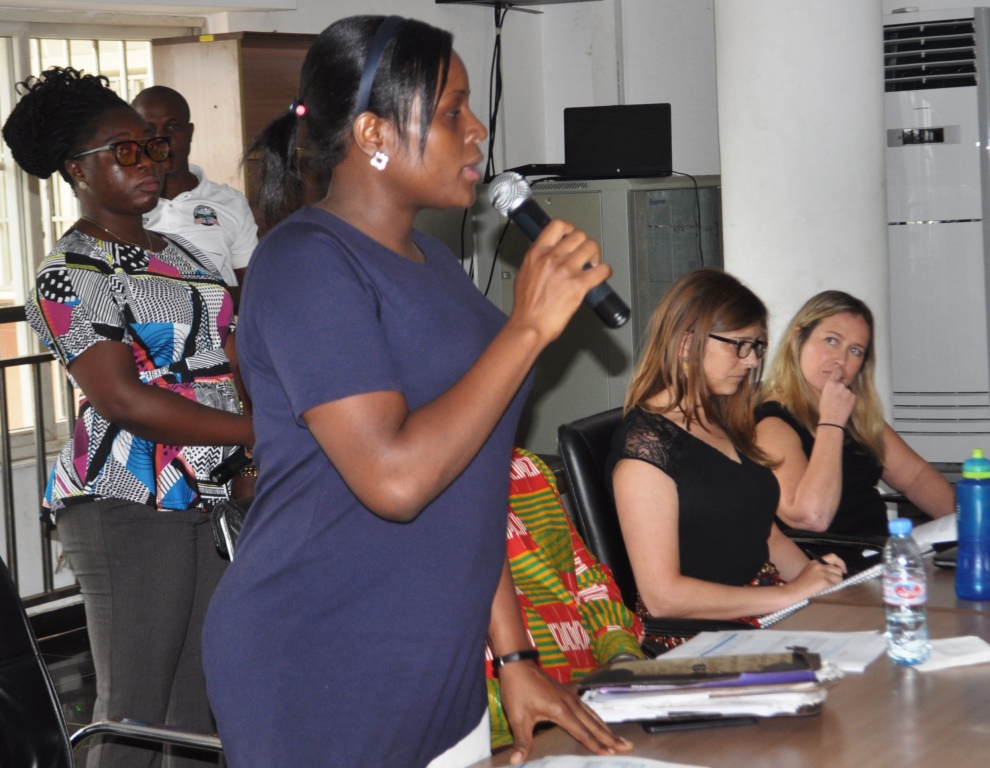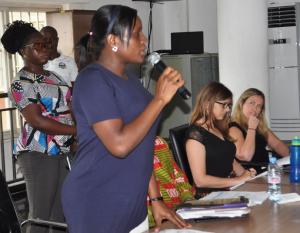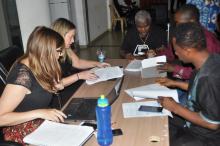Liberia Ministry of Health and Partners Validate National Cancer Policy
 The Ministry of Health and partners have validated the National Cancer Policy for Liberia at a well-attended workshop in Monrovia. The workshop organized by the Non-Communicable Disease Division of Ministry of Health with support from the World Health Organization (WHO), Mt. Sinai Hospital – USA, and other partners brought together professionals from the Women Global Cancer Initiative, Liberian Cancer Society, Clinton Health Access Initiative (CHAI), National Public Health Institute of Liberia, Hospitals, Civil Society Organizations and members of the media.
The Ministry of Health and partners have validated the National Cancer Policy for Liberia at a well-attended workshop in Monrovia. The workshop organized by the Non-Communicable Disease Division of Ministry of Health with support from the World Health Organization (WHO), Mt. Sinai Hospital – USA, and other partners brought together professionals from the Women Global Cancer Initiative, Liberian Cancer Society, Clinton Health Access Initiative (CHAI), National Public Health Institute of Liberia, Hospitals, Civil Society Organizations and members of the media.
The lack of a systematic functional mechanism to assess the burden of cancer in Liberia necessitated urgent development of a National Cancer Policy to guide cancer planning and management in the country. Although various public and private institutions are rendering some form of cancer care, however, critical gaps do exist due to lack of the provision of an integrated evidence-based care program, standardized treatment guidelines, a population-based cancer registry, among others. This has resulted in the implementation of non-standardized cancer services in the country.
The development of the National Cancer Policy is aimed at establishing a functional and standardized cancer prevention and control mechanism through a multi-sectoral and multi-disciplinary approach to guide the establishment, development of infrastructure and appropriate skills mixed. It is also intended to create an effective cancer program that entitles, effective screening, early detection and diagnosis, appropriate treatment, continuous surveillance, and operational research. The validation workshop provided an opportunity for a comprehensive and critical review and validation of the policy by relevant stakeholders.
Making opening remarks on behalf of the Minister of Health, Mrs. Joyce Sherman, Assistant Minister for Preventative Services, applauded the National Cancer Committee for its efforts to ensure that a national policy on cancer is developed and implemented in Liberia. Mrs. Sherman further expressed gratitude to the committee for developing the policy. She emphasized the need to urgently integrate management of NCDs in healthcare delivery, sighting that NCDs are fast becoming issues of public health concern and therefore need urgent attention. She then registered the Government’s commitment to work with relevant stakeholders to ensure effective implementation of the policy.
In his remarks, Dr. Fred Amegashie, Director, Non-Communicable Diseases Division, Ministry of Health, lauded the development and validation of the National Cancer Policy as a major milestone in addressing the burden of cancer in Liberia. He noted that in Liberia, cervical cancer is the most common cancer among women with an estimated 366 new cases annually. He thanked the WHO, Mt. Sinai Hospital and all partners who have provided support to the NCD program in the development of the National Cancer Policy.
Speaking on behalf of Dr. Mesfin G. Zbelo, Officer-in-charge of WHO Liberia, Ms. Victoria Katawera Nyanzi, WHO-Liberia NCDs Technical Officer, expressed gratitude to the Government of Liberia and stakeholders for their continued partnership in addressing health needs of the population. Ms. Nyanzi congratulated the Government of Liberia for the milestone achieved towards implementation of global commitments on NCDs, as well as contributing to achieving the objectives of the Global Action Plan for the prevention and control of non-communicable diseases to which cancer is apart. She further indicated that cancers are the second most commonly reported NCDs globally accounting for over 20% (8.4 million) of deaths due to NCDs annually. She further inferred that the human price is not only the loss of life caused by cancer but includes immense costs to health systems, insufferable economic and emotional burdens on families, and irreplaceable losses for communities. She concluded that the National Cancer Policy for Liberia provides a platform for planning and implementation of sustainable and cost-effective interventions that will drive prevention, treatment and control of cancers in the country. She then committed WHO’s continued support to Liberia to control the burden of cancer.
The Policy being validated has six major sections: prevention, early detection and diagnosis, treatment and surveillance, pain management and palliative care, research, and, monitoring and evaluation. The policy reflects the developing knowledge on the risk factors for cancer, and embraces the experiences gained from neighboring countries on the African continent who have led the way in establishing similar programs, as well as from international partners.
The Policy also recognizes that available infrastructures are inadequate to address the various types of cancers that affect Liberia’s population, and therefore proposes an incremental response to cancer management beginning with health education and creating awareness, active screening for breast and cervical cancer, appropriate treatment of these cancers within available resources, and the collection of appropriate and timely data on other cancers affecting the population. The policy also takes cognizant of the fact that there is a need to address other types of cancer rather than the current emphasis on the two mentioned cancers; breast and cervical cancers.
During the technical session of the workshop, participants were placed into various working groups to review various sections of the Policy. Following hours of deliberations, the Policy was validated, and a small technical group was established to consolidate, refine and finalize the Policy and develop a road map for its implementation.
+(231) 770469221
katawerav [at] who.int (katawerav[at]who[dot]int)
Health Information and Promotion officer
Tel : +(231) 776532008
Email: lakev [at] who.int (lakev[at]who[dot]int)




